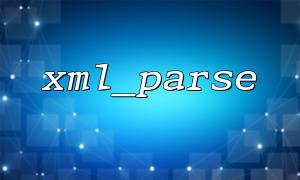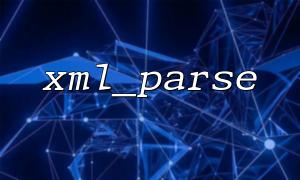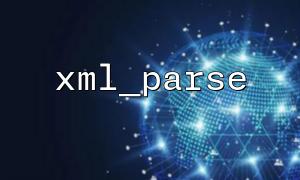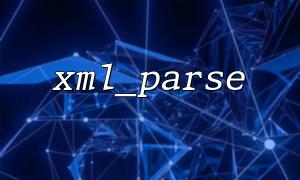Why does ignoring the namespace when using xml_parse causes XML parsing errors?
XML (Extensible Markup Language) is a widely used data storage and exchange format. XML plays an important role in web development and data interaction between different systems. PHP provides the xml_parse function to parse XML documents and process the data in it. However, in actual development, many developers have encountered the situation where they ignore the XML namespace and lead to parsing errors when using xml_parse . So, why does ignoring the namespace lead to parsing errors? This article will analyze this problem one by one.
In XML, namespace is a mechanism used to distinguish elements or attributes of the same name. When different XML data sources or different XML standards are used, namespaces are usually used to distinguish them in order to avoid duplication of element or attribute names. Namespaces are usually defined by the xmlns attribute, which provides a unique identifier for an element or attribute.
For example, here is a simple XML document containing the definition of the namespace:
<book xmlns:ns="http://m66.net/book">
<ns:title>PHP Programming</ns:title>
<ns:author>John Doe</ns:author>
</book>
In this example, xmlns:ns="http://m66.net/book" defines a namespace ns , and both title and author elements belong to this namespace.
The xml_parse function is the core function used in PHP to parse XML data. It receives XML data and returns parsing results according to the structure of the document. xml_parse is an event-driven parser that reads XML data step by step and triggers different events.
However, when XML data contains namespaces, if we do not handle the namespace correctly, problems will arise in the parsing process. Specifically, ignoring namespaces can cause the following problems:
Element name conflict <br> If multiple XML documents use the same element name but they belong to different namespaces, xml_parse cannot correctly distinguish these elements after the namespace is ignored, and there may be parsing errors. For example, <title> and <author> may have different meanings in different namespaces, but after ignoring the namespace, the parser cannot distinguish them.
Unable to access elements in the namespace correctly <br> When parsing XML with namespaces, ignoring the namespace can cause elements to be accessed correctly. Taking the above book example as an example, the parser will not recognize ns:title and ns:author because they are treated as ordinary title and author elements.
Output error or incomplete data <br> If the namespace is not processed correctly, xml_parse may throw an error or fail to generate a complete parsing result, causing an exception to the program or output incomplete data.
To avoid these problems, when dealing with XML data with namespaces, we need to explicitly consider the namespace when parsing. We can use xml_set_object or xml_set_character_data_handler to handle these namespaces, or use PHP's SimpleXML extension, which can automatically handle namespaces.
Here is an example of parsing XML with namespace using SimpleXML :
$xml = simplexml_load_string($xml_string, "SimpleXMLElement", LIBXML_NOCDATA);
// Handle elements with namespace
$namespace = "http://m66.net/book";
$title = $xml->children($namespace)->title;
$author = $xml->children($namespace)->author;
echo "Title: $title\n";
echo "Author: $author\n";
In this example, children($namespace) allows us to look for elements in a specific namespace, avoiding the problem of element name conflicts.
When processing XML data with namespaces, if the namespace is ignored, the xml_parse function may parse errors, resulting in the inability to correctly access and distinguish XML elements. To avoid this, developers need to make sure the namespace is handled correctly during parsing. Using SimpleXML or other specialized XML parsing libraries can effectively avoid namespace-related problems and ensure that XML data is correctly parsed and processed.















